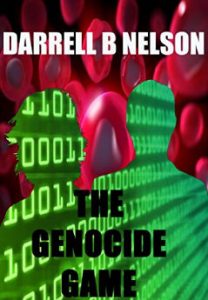
This week on the author blog, Leland Lydecker reviews The Genocide Game. A megalomaniac billionaire with an automation fetish plots to wipe out ninety-eight percent of the world’s population, and it falls to Stan– pick-up artist guru and self-proclaimed word-nerd– to save the world.
To be more accurate, Stan bumps into Raven, a scientist on the run from her job in the billionaire’s R&D lab, and offers to help her. Pretty soon they’re both on the run from Ferguson’s comically inept goons, racing to reveal the existence of a genetically engineered super-virus before Ferguson can unleash it on the world.
Although it sounds like a cool premise, The Genocide Game has some unfortunately fatal flaws. Let’s start with Stan.
The Genocide Game’s protagonist isn’t much of a hero. The book opens on Stan deliberately infecting women with a deadly virus and he doesn’t become much more likeable from there on, despite the author’s attempts to paint him as an awkward nerd who “only” got into college on a diving scholarship. He came from a troubled home, guys! I mean, not really troubled. He wasn’t abused and didn’t grow up in poverty, but his parents were both working and weren’t as emotionally available as he would have liked.
This isn’t the first book I’ve read with a nerdy male lead who has a few hangups. It’s been done and it can work. But Stan isn’t your stereotypical nerd. He’s a pick-up artist “guru,” a guy who teaches others how to use a combination of degrading psychological warfare, intimidation, and copious quantities of alcohol to compromise the consent of women who wouldn’t ordinarily be willing to sleep with them. And if that sounds disturbingly similar to sexual assault, then congratulations– you’re probably a decent human being.
For me, and I imagine for most people, Stan’s character is about as appealing and relatable as three-day-old roadkill. In fact, I’ve probably felt more sympathy for roadkill than I ever managed to muster for Stan. Although the author tries to paint him and his PUA brethren as benign normal Joes frustrated by the “unfairness” of women’s attraction, it’s a tough sell.
The Genocide Game has a lot of interesting concepts– a genetically engineered virus, cyberneural implants, cyber soldiers, and privately owned surveillance satellites among other things– but most of them are covered so briefly that they come across as little more than flashy gimmicks. The cool tech plays frustratingly little role in the story, taking a back seat to Stan’s personal hangups and messy past.
Stan enlists the help of his pick-up artist cohorts, and a great deal of time is spent going on about how scientific their methods are and how easily they’re able to evade surveillance and capture. Although PUAs take precautions like these in an attempt to evade the legal consequences of sexual assault, they’re only successful when faced with apathetic, underfunded law enforcement. The idea that they could defeat a Blackwater-esque private army is uproariously laughable.
As the story goes on the plot becomes less and less believable. The Genocide Game feels like a mashup of a low-budget SciFi Channel thriller, an advertisement for the pick-up artist lifestyle, and one of those movies about the personal struggles of a middle class white guy. There are also quite a few editing and proofing errors.
If flashy gimmicks and grossly unrealistic scenarios are your thing, and you can tolerate the protagonist proudly describing his scientific method for committing date rape, then you may get more out of this book than I did. Otherwise, this is a scifi thriller that’s probably worth steering clear of. 2.5 stars.

1 thought on “Darrell B. Nelson’s The Genocide Game”